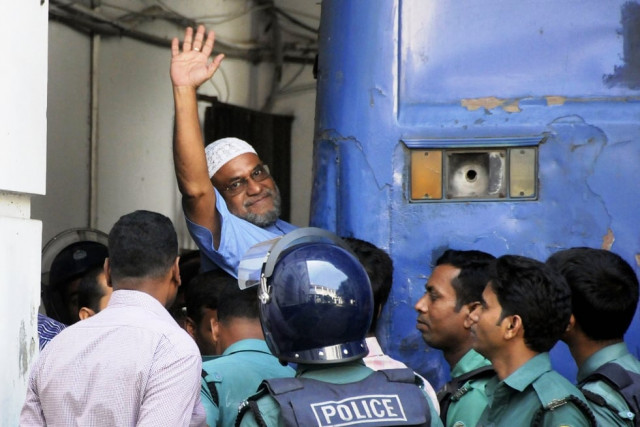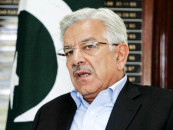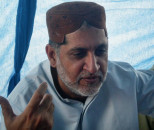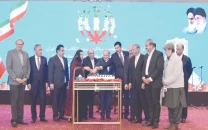Pakistan 'deeply saddened' over Dhaka's execution of Jamaat leader
Mir Quasem Ali hanged for 'committing war crimes' during 1971 independence conflict; Bangladesh summons Pakistan...

Jamaat-e-Islami party leader, Mir Quasem Ali waves his hand as he enters a van at the International Crimes Tribunal court in Dhaka on November 2, 2014. PHOTO: AFP
“Pakistan is deeply saddened over the execution of Mir Quasem Ali for the alleged crimes committed before December 1971, through a flawed judicial process,” said a statement issued by Foreign Office spokesperson Nafees Zakaria late on Saturday.
Ali was executed after being convicted by a controversial war crimes tribunal for offences committed during the 1971 independence conflict with Pakistan.
The 63-year-old was hanged at the Kashimpur high security jail in Gazipur, some 40 kilometres (25 miles) north of Dhaka, amid stepped-up security outside the prison and in the capital.
Pakistan said the act of suppressing the opposition, through flawed trials is completely against the spirit of democracy.
“Ever since the beginning of the trials, several international organisations, human rights groups and international legal figures have raised objections to the court proceedings, especially regarding fairness and transparency as well as harassment of lawyers and witnesses representing the accused.
Bangladesh hangs top financier of Jamaat-e-Islami
Urging Bangladesh to uphold its commitment, as per the Tripartite Agreement of 1974, wherein it “decided not to proceed with the trials as an act of clemency”, the spokesperson said recriminations for political gains are counter-productive.
“Pakistan believes that matters should be addressed with a forward looking approach in the noble spirit of reconciliation,” it said.
Six opposition leaders have now been executed for war crimes after the secular government led by Prime Minister Sheikh Hasina set up a domestic war crimes tribunal in 2010. With Ali’s death, all five top leaders of the Jamaat party have been hanged.
The executions and convictions of Jamaat officials plunged Bangladesh into one of its worst crises in 2013 when tens of thousands of activists clashed with police in protests that left some 500 people dead. Rights groups have criticised the war crimes trials, saying they were flawed and lack any foreign oversight.
A group of United Nations human rights experts last week urged Bangladesh to annul Ali’s death sentence and to retry him in compliance with international standards. But Hasina’s government has defended the trials, saying they are needed to heal the wounds of the conflict, which it says left three million people dead. Independent researchers put the war toll much lower.
Bangladesh summons Pakistan envoy
Bangladesh on Sunday summoned Pakistan's acting high commissioner to protest its ‘interference’ in its affairs after Islamabad said it was "deeply saddened" by the execution of the Jamaat leader.
"By repeatedly taking the side of those Bangladesh nationals who are convicted of crimes against humanity and genocide, Pakistan has once again acknowledged its direct involvement and complicity with the mass atrocity crimes committed during Bangladesh's Liberation War in 1971," Bangladesh said in a statement.
"The Government of Bangladesh strongly rejects Pakistan's claim that these are 'recriminations for political gains'."



















COMMENTS
Comments are moderated and generally will be posted if they are on-topic and not abusive.
For more information, please see our Comments FAQ